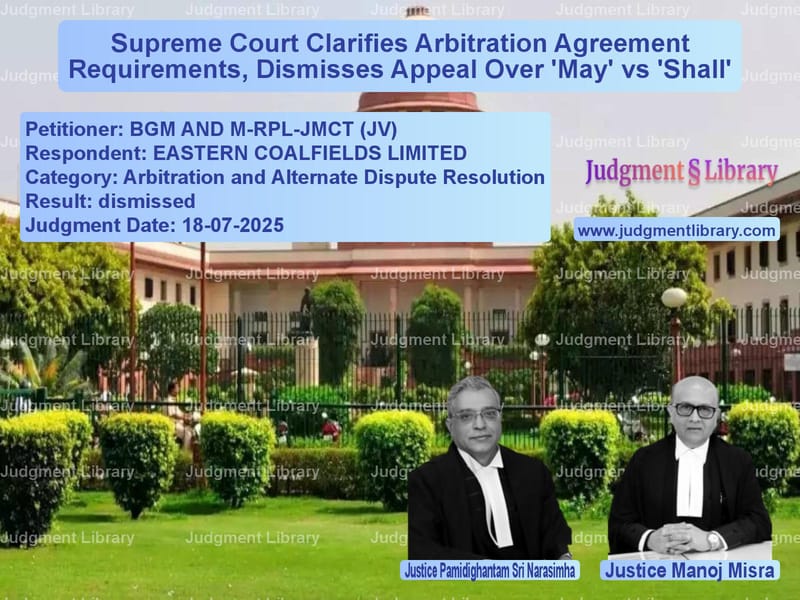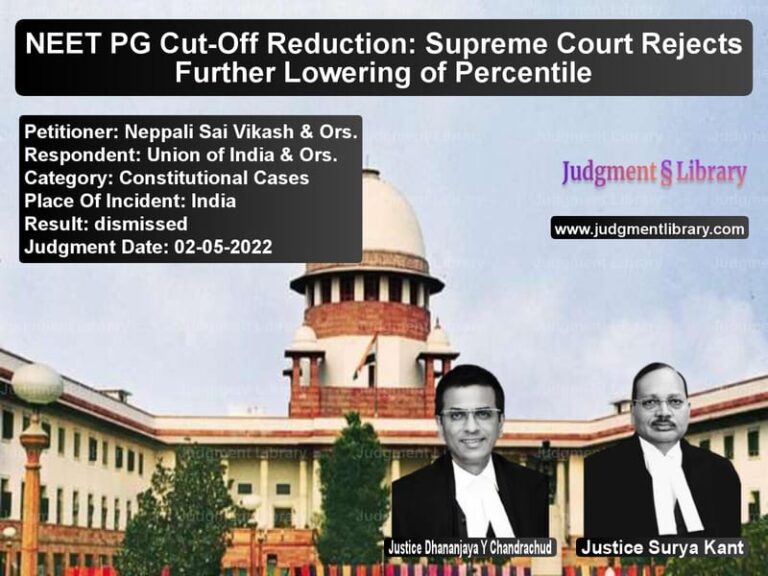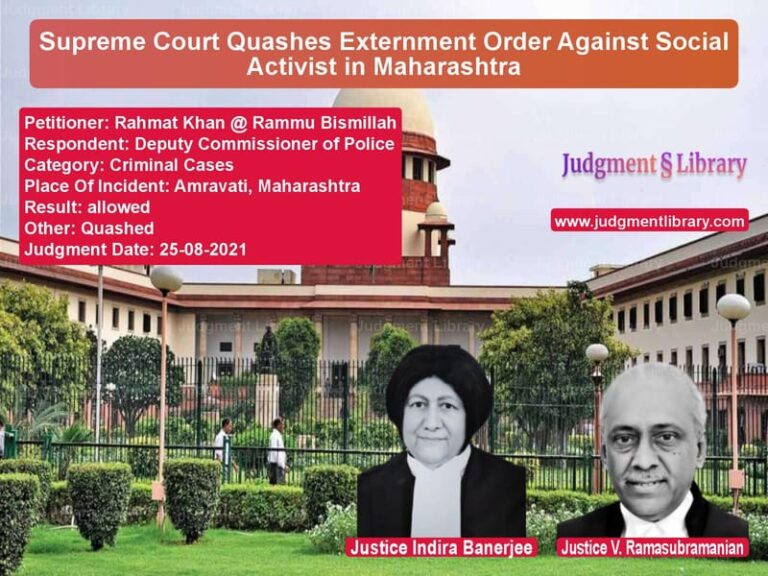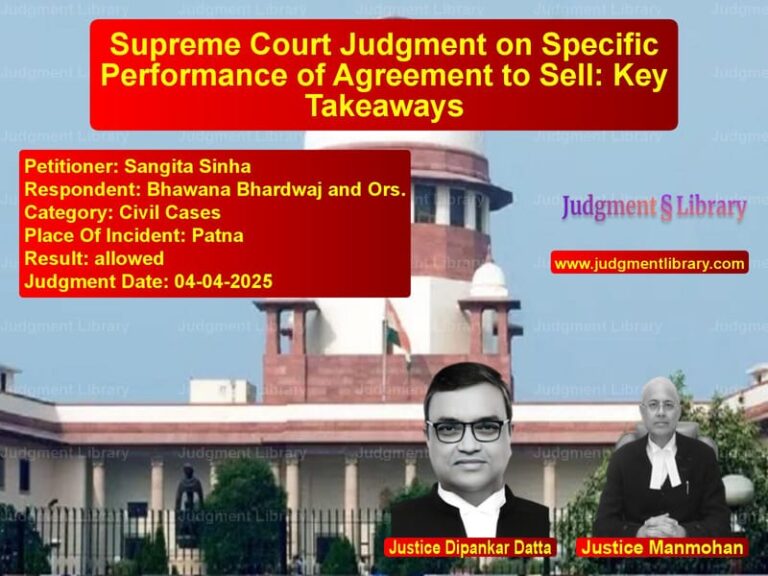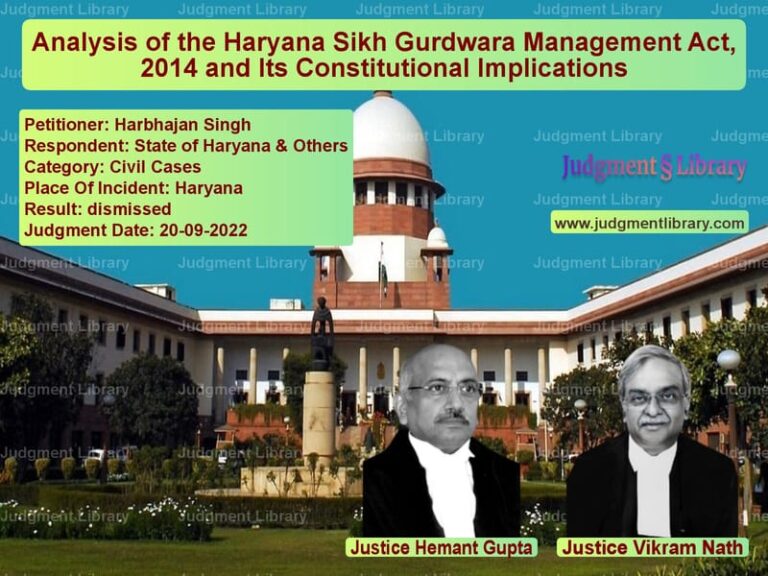Supreme Court Clarifies Arbitration Agreement Requirements, Dismisses Appeal Over ‘May’ vs ‘Shall’
In a significant ruling that clarifies the essential requirements for a valid arbitration agreement, the Supreme Court of India has dismissed an appeal seeking appointment of an arbitrator, holding that the use of the word “may” in a dispute resolution clause indicates the absence of a binding arbitration agreement. The case involved BGM and M-RPL-JMCT (JV) as the appellant and Eastern Coalfields Limited as the respondent, centering around the interpretation of Clause 13 in their contract relating to transportation and handling of goods.
The dispute arose when the appellant, treating a portion of Clause 13 as an arbitration agreement, filed an application under Section 11(6) of the Arbitration and Conciliation Act, 1996 for appointment of an arbitrator. The respondent objected, contending that Clause 13 lacked the essential ingredients to constitute a valid arbitration agreement. The High Court agreed with the respondent and dismissed the application, leading to the present appeal before the Supreme Court.
The Controversial Clause 13
At the heart of the dispute was Clause 13 of the General Terms and Conditions, which was titled “SETTLEMENT OF DISPUTES.” The clause began by stating that “It is incumbent upon the contractor to avoid litigation and disputes during the course of execution.” It then provided a multi-stage dispute resolution mechanism, first referring disputes to Area CGM, GM, and then to a committee constituted by the owner if differences persisted.
The crucial portion that became the subject of interpretation stated: “In case of parties other than Govt. Agencies, the redressal of the dispute may be sought through ARBITRATION AND CONCILIATION ACT, 1996 as amended by AMENDMENT ACT OF 2015.” The appellant relied on this portion as constituting an arbitration agreement, while the respondent argued that the use of the word “may” indicated that arbitration was merely an option, not a binding obligation.
Arguments of the Parties
The learned counsel for the appellant contended that the use of the word “may” only indicated that parties had an option to take recourse to arbitration under the 1996 Act. However, once that option was exercised by any party, it became a binding contract to settle disputes through arbitration. The appellant also argued that at the stage of appointment of an arbitrator, the court should only examine whether an arbitration agreement exists prima facie, leaving the final determination to the arbitral tribunal under Section 16 of the Act.
Per contra, the learned counsel for the respondent supported the High Court’s order and referred to Clause 32 of the Instructions to Bidders, which stated that “Matters relating to any dispute or difference arising out of this tender and subsequent contract awarded based on this tender shall be subject to the jurisdiction of District Court where the subject work is to be executed.” The respondent argued that the use of the word “may” in Clause 13 clearly indicated that at the time of entering the agreement, parties were not ad idem on referring present or future disputes to arbitration.
The Supreme Court’s Legal Analysis
The Supreme Court, comprising Justices Pamidighantam Sri Narasimha and Manoj Misra, framed three issues for consideration: whether the question of existence of an arbitration agreement should be left for the arbitral tribunal; whether Clause 13 constitutes an arbitration agreement under Section 7 of the 1996 Act; and whether Clause 32 of Instructions to Bidders negates the existence of an arbitration agreement.
On the first issue, the Court extensively referred to the recent seven-judge Constitution Bench decision in Interplay Between Arbitration Agreements under Arbitration, 1996 & Stamp Act, 1899, In re, which clarified that “Section 11 confines the Court’s jurisdiction to the examination regarding the existence of an arbitration agreement. The use of the term ‘examination’ in itself connotes that the scope of the power is limited to a prima facie determination.”
The Court elaborated that “Referral Courts only need to consider one aspect to determine the existence of an arbitration agreement — whether the underlying contract contains an arbitration agreement which provides for arbitration pertaining to the disputes which have arisen between the parties to the agreement.” However, the Court emphasized that “where professed arbitration agreement is found in an undisputed document, no trial or inquiry is required as to its existence. In such a situation, the Court would have to simply peruse the same to satisfy itself whether it, prima facie, fulfills the essential ingredients of an arbitration agreement.”
Essential Ingredients of Arbitration Agreement
The Court then examined what constitutes a valid arbitration agreement under Section 7 of the 1996 Act. Referring to Bihar State Mineral Development Corporation vs. Encon Builders, the Court culled out the essential ingredients: “(a) there must be a present or future difference in connection with some contemplated affair; (b) the parties must intend to settle such difference by a private tribunal; (c) the parties must agree in writing to be bound by the decision of such tribunal; and (d) the parties must be ad idem.”
The Court extensively relied on its landmark decision in Jagdish Chander vs. Ramesh Chander and Others, where it had summarized the principles regarding what constitutes an arbitration agreement. The Court quoted: “The intention of the parties to enter into an arbitration agreement shall have to be gathered from the terms of the agreement. If the terms of the agreement clearly indicate an intention on the part of the parties to the agreement to refer their disputes to a private tribunal for adjudication and a willingness to be bound by the decision of such tribunal on such disputes, it is arbitration agreement. While there is no specific form of an arbitration agreement, the words used should disclose a determination and obligation to go to arbitration and not merely contemplate the possibility of going for arbitration.”
The Court particularly emphasized that “Where there is merely a possibility of the parties agreeing to arbitration in future, as contrasted from an obligation to refer disputes to arbitration, there is no valid and binding arbitration agreement.” The judgment further clarified that “mere use of the word ‘arbitration’ or ‘arbitrator’ in a clause will not make it an arbitration agreement, if it requires or contemplates a further or fresh consent of the parties for reference to arbitration.”
Application to the Present Case
Applying these principles to Clause 13, the Supreme Court agreed with the High Court’s interpretation. The Court held that “Use of the words ‘may be sought’, imply that there is no subsisting agreement between parties that they, or any one of them, would have to seek settlement of dispute(s) through arbitration. It is just an enabling clause whereunder, if parties agree, they could resolve their dispute(s) through arbitration.”
The Court rejected the appellant’s argument that Clause 13 provided an option that either party could unilaterally exercise, stating that “the phraseology of clause 13 is not indicative of a binding agreement that any of the parties on its own could seek redressal of inter se dispute(s) through arbitration.”
The Court distinguished the present case from situations where clauses use mandatory language like “shall be referred to arbitration,” which would constitute a binding arbitration agreement. Here, the use of “may be sought” indicated that arbitration was merely a possibility that required further agreement between the parties.
Broader Implications
This judgment reinforces the fundamental principle that arbitration is a creature of contract, and parties must clearly express their intention to be bound by arbitration. The Court’s emphasis on the distinction between “may” and “shall” provides crucial guidance for drafters of commercial contracts.
The decision also clarifies the scope of examination under Section 11 of the Arbitration Act, establishing that while courts should generally take a prima facie view of the existence of an arbitration agreement, they must still ensure that the essential ingredients of Section 7 are satisfied. Where the clause clearly indicates the absence of a binding arbitration agreement, courts are justified in rejecting applications for appointment of arbitrators.
The Supreme Court’s dismissal of the appeal serves as an important reminder to parties entering into contracts to carefully draft dispute resolution clauses. Ambiguous language that leaves room for interpretation can lead to protracted litigation over whether an arbitration agreement exists, defeating the very purpose of arbitration as an efficient dispute resolution mechanism.
This judgment will likely influence how courts interpret similar clauses in commercial contracts, particularly in government and public sector undertakings where standardized contract terms often contain dispute resolution mechanisms that may not clearly establish binding arbitration agreements.
Petitioner Name: BGM AND M-RPL-JMCT (JV).Respondent Name: EASTERN COALFIELDS LIMITED.Judgment By: Justice Pamidighantam Sri Narasimha, Justice Manoj Misra.Judgment Date: 18-07-2025.Result: dismissed.
Don’t miss out on the full details! Download the complete judgment in PDF format below and gain valuable insights instantly!
Download Judgment: bgm-and-m-rpl-jmct-(-vs-eastern-coalfields-l-supreme-court-of-india-judgment-dated-18-07-2025.pdf
Directly Download Judgment: Directly download this Judgment
See all petitions in Arbitration Awards
See all petitions in Commercial Arbitration
See all petitions in Arbitration Act
See all petitions in Dispute Resolution Mechanisms
See all petitions in Contract Disputes
See all petitions in Judgment by P.S. Narasimha
See all petitions in Judgment by Manoj Misra
See all petitions in dismissed
See all petitions in supreme court of India judgments July 2025
See all petitions in 2025 judgments
See all posts in Arbitration and Alternate Dispute Resolution Category
See all allowed petitions in Arbitration and Alternate Dispute Resolution Category
See all Dismissed petitions in Arbitration and Alternate Dispute Resolution Category
See all partially allowed petitions in Arbitration and Alternate Dispute Resolution Category

